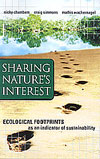
![]()
Search the Journey to Forever website – click HERE
|
Journey to Forever: Make a donation |
Navigation
Contact usTo Keith Addison Handmade Projects |
Eco-footprint
Are you too big for your boots? How heavily do you tread upon the world? Let's see how you measure up.
Your ecological footprint is the amount of land it takes to support your way of life, your lifestyle.
The worldwide average per capita footprint is 2.4 hectares, or 6 acres. If we leave only 12% of the biosphere for other species, there are less than 2 hectares available per person, or 5 acres each -- this means that we humans overshoot the mark by at least 20%.
That's a very important number -- it's the measure of just how "unsustainable" we are. This is why environmental issues are so important.
How many people have smaller eco-footprints than the world average? -- 73%, and very many of them don't have enough.
About 80% of humanity's total eco-footprint is taken up by 97.5% of the population.
The other 20% of the global human eco-footprint is taken by only 2.5% of the world population. These are the few who have far too much. Without them, the overshoot would go back to zero -- we'd still be sustainable, though only just.
The ecological footprint of the average American is 12 hectares, 30 acres. The average Canadian needs one third less, and the average Italian 55% less.
So where do you stand?
This calculator will give you a rough estimate -- it assumes you're an average North American, but even if you're not it will give you an idea.
http://www.lead.org/leadnet/footprint/intro.htm
Use the Redefining Progress Footprint Calculator to assess the distribution of footprints and income worldwide. Requires a java enabled browser.
http://www.rprogress.org/programs/sustainability/ef/distribution.html
Redefining Progress has a lot of information and excellent resources on eco-footprints.
http://www.rprogress.org/programs/sustainability/ef/
Ecological Footprint Lifestyle Calculator
http://www.bestfootforward.com/footprintlife.htm
Are you helping to save humanity or contributing to its downfall? You could be in for a shock. New Scientist.
http://www.newscientist.com/hottopics/environment/quiz1a.jsp
How many Earths would be needed if everyone on the planet enjoyed your standard of living? Find out how much land is needed to support your lifestyle -- your ecological footprint. New Scientist: Global Environment Report
http://www.newscientist.com/hottopics/environment/quiz2.jsp
Some comparisons of national energy consumption -- USA, EU, Germany, France, Japan, Australia, and India, Sudan, and Nepal. The average American uses twice as much energy as the average European or Japanese and 155 times as much as the average Nepalese. See Energy Consumption.
 "Sharing Nature's Interest" by Nicky Chambers, Craig Simmons, Mathis Wackernagel, Earthscan, ISBN 1853837393
"Sharing Nature's Interest" by Nicky Chambers, Craig Simmons, Mathis Wackernagel, Earthscan, ISBN 1853837393
"An invaluable and accessible resource for any individual, business or communityou attempting to understand, quantify or explore human impact on the environment."
http://www.ecologicalfootprint.com/
"Turn the Tide" is a new online program to help ordinary people do something effective to protect the environment -- and keep track of how well they do so. The program, by the Center for a New American Dream, offers participants nine simple, ecologically smart ways to change their lives, from cutting car trips to canceling junk mail. The center describes the program as a "powerful tool" for demonstrating the impact of small changes in individual behaviour. Each member has a personal log, and the site calculates how many resources the member saves.
"Turning the Tide on the Environment", Washington Post, October 17, 2001
http://www.washingtonpost.com/wp-dyn/articles/A6317-2001Oct17.html
Turn the Tide -- Nine Actions for the Planet
http://www.newdream.org/turnthetide/